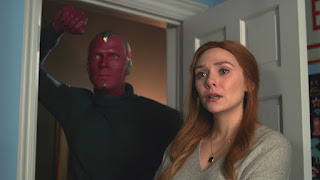
Paul Bettany and Elizabeth Olsen
None of us really knew what we were getting into when we started watching Marvel’s WandaVision on Disney+. If you stuck with it through all nine episodes, you have been rewarded with one of the most moving and human stories in the Marvel Cinematic Universe.
One of the aspects of the MCU that sets its characters apart from other franchises is their humanity. They may be gifted with superpowers, but they are ultimately human (even the synthetic life forms). For me, it is not the big action sequences that draw me in and keep me involved but the intimate human moments of love, loss, sacrifice, and remembrance. The pivotal scenes in the final episode of WandaVision are not the battles but the goodbyes.
Someone observed that Wanda Maximoff (Elizabeth Olsen) is the most traumatized character in the MCU, but there is plenty of trauma to go around there. Tony Stark (Robert Downey, Jr.) had to deal with the assassination of his father as did T’Challa (Chadwick Boseman). Steve Rogers (Chris Evans) lost (he thinks) his best friend during World War Two, was frozen for decades and not had to only deal with a strange new world but deception as well (not to mention the death of his first love). Natasha Romanova hardly had a traditional upbringing. Although Wanda might not be the most traumatized MCU character, she has had more than enough emotional stress to lead to a nervous breakdown.
Emotional breakdown due to grief is at the center of the series. Wanda is attempting to cope with loss and not in the most productive way. In the words of one of the townspeople she has held captive, “Your grief is poisoning us.” Often, as we process our grief, we find ourselves lashing out and being destructive, just like Wanda.
WandaVision is, in the MCU terminology, an origin story. Up to this point, we have seen Wanda has a secondary and supporting character. She does not even have a heroic title like “Black Widow” or “Captain America.” This is an extended movie that brings her to the forefront of the MCU. Out of her grief, her identity develops. As the Darkhold (a mysterious ancient book) declares, “The Scarlet Witch is not born, she is forged.”
By the end of the series, Wanda has made a breakthrough and is finding a way to live with her grief. This begins in episode 8 when, in a flashback, Vision (Paul Bettany) tells her, “But what is grief, if not love preserving?" In the final episode, Wanda has obtained enough stability to say good-bye to her magically created twin boys and to Vision. “We have said goodbye before,” Vision says, as her shrinking Hex closes in on them, “so it stands to reason–” “–we’ll say hello again,” Wanda replies, completing the sentiment. There is closure, although bittersweet.
Does Wanda have a clear path forward? The post credit scene suggests that she is still searching but with new insight and understanding. Is the Scarlett Witch a hero or a villain? Perhaps she is a bit of both, even as each of us is. We are created in the image of God but flawed and often giving in to sin and rebellion. We usually know the right thing to do, even if we choose not to pursue it. But there is hope.
It is said that “No ever really dies in science fiction.” The same may be said for those of us who embrace the Christian faith. Those we love who have died are still with us and our hope is to join them eternally. The journey continues.
Comments